Matt Harris, Park University
Thu, February 1, 2024

Travis Kelce celebrates with Taylor Swift on Jan. 28, 2024, after the Kansas City Chiefs defeated the Baltimore Ravens in the AFC championship game.
A pop icon falling for one of the NFL’s preeminent superstars may seem like a slice of Americana – a scene from a small-town high school magnified by a factor of 10 million.
But this is America in 2024 so, of course, nothing magical stays that way.
To be clear, public opinion data suggests that most Americans think Taylor Swift is good for the NFL. But with her beau Travis Kelce’s Kansas City Chiefs heading to a fourth Super Bowl in five years, and with Swift herself reportedly preparing for a journey across the globe to cheer him on in the big game, the right-wing talk machine has gone into overdrive.
Fox News host Jesse Watters suggested that Swift may be a Pentagon asset used to combat online misinformation. Former GOP presidential candidate Vivek Ramaswamy tweeted that he thinks Swift and Kelce are being artificially propped up by the media pending an upcoming Swift endorsement of Joe Biden. OAN referred to the couple as a “Massive Super Bowl Psy-op,” a brainwashing campaign designed to indoctrinate citizens to an elite agenda and away from religion.
The idea that the Swift-Kelce romance is some sort of deep-state plot is perhaps gaining some traction in far-right circles because it lines up with other right-wing conspiracy theories and the right’s broader agenda.
Swift’s NFL fandom
Swift has endorsed Democrats in the past, including Joe Biden in 2020. Kelce, while not politically outspoken, was featured in a Pfizer ad touting the COVID-19 vaccine.
Republicans are more likely than Democrats to believe, without evidence, that a secret group of rulers is controlling the world, as well as that vaccines cause autism. While there isn’t public opinion data yet on the theories from Fox News and the right-wing echo chamber that the Swift-Kelce romance is an elaborate left-wing scheme, it contains elements of similar conspiracies for which partisan splits exist.
And opinions on Swift herself are similarly polarized. The singer is viewed favorably among virtually all groups in America, although Republicans are the only group in which as many members dislike Swift as like her.
Taylor Swift has brought a unique element to NFL fandom. I haven’t seen fans of my hometown Buffalo Bills make signs denigrating a pop star since they thought Jon Bon Jovi wanted to buy the team and move it to Toronto in 2014.
Yet, as a political scientist, I know it’s an open question whether any of this matters politically.
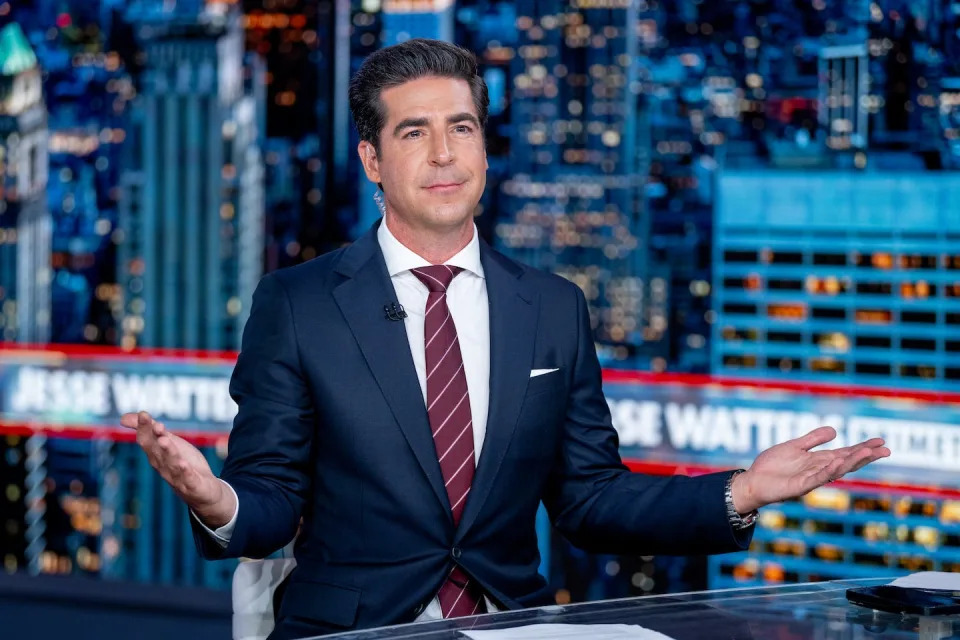
Fox News host Jesse Watters has speculated, without evidence, that Swift may be a Pentagon asset.
In the background of these conspiracy theories is the possibility that Taylor Swift could endorse Joe Biden. The Trump campaign is reportedly thinking about such a possibility, with allies talking behind the scenes about a “holy war” against Swift, brainstorming ways of painting her as a left-wing celebrity advancing an elite Democratic agenda.
But how much would such an endorsement matter?
In political science literature, a hallmark case of the power of celebrity endorsements is Oprah Winfrey’s 2008 backing of Barack Obama. Winfrey’s endorsement occurred during a primary in which he was taking on a more well-known opponent, Hillary Clinton.
Winfrey’s endorsement, wrote the authors of a prominent study of the case, led participants in the study “to see Obama as more likely to win the nomination and to say that they would be more likely to vote for him.” In other words, it helped advance public perceptions of Obama’s viability as a candidate.
A Swift endorsement of Biden would be different.
Swifties are largely suburban and young. Almost half are millennials, and over 10% belong to Gen Z. They represent a slice of the youth vote that candidates have attempted to court for decades, and the suburbs are increasingly a battleground in the country’s urban-rural divide. A Swift Instagram post in 2023 helped lead to 35,000 new voter registrations – and her ability to generate funds could also be invaluable to Biden.
But an Oprah-like effect is less likely for a Swift endorsement of Biden, who is running as an incumbent without a serious primary challenger and his status as the Democratic nominee is certain.
Further, polling demonstrates that the effect of a Swift endorsement could be essentially a net wash, with 18% of the public saying they’d be more likely to support a Swift-backed candidate and 17% saying they would be less likely to support Swift’s favored choice.
Even those numbers might be affected by partisan-motivated reasoning, where a person’s party identification colors their perceptions of information. Swift’s prior backing of Democrats and perceived liberalism might cause her supporters and detractors to use polling questions asking about a potential Swift endorsement to express support or disfavor of her, regardless of how her endorsement would actually influence their choice.

A Swift endorsement, if it comes, could be less important than Donald Trump’s response to that endorsement.
Not just a love story
Essentially, a Swift endorsement might matter at the margins, but there are many, many other factors at play in a general election. That’s especially true in an election between two men who have both served as commander in chief, a rarity in American politics.
A Swift endorsement, then, is perhaps less important in and of itself than Donald Trump’s response to a Swift endorsement of Biden.
Public opinion polling in the wake of Trump’s Access Hollywood remarks in 2016 showed that majorities of both women and men believed Trump had little or no respect for women. But Trump actually improved his numbers among women voters in 2020.
A Swift endorsement of Biden could bring out some of Trump’s worst impulses. Perhaps the effect of his response on how voters view him could be more important than her endorsement of Biden.
This article is republished from The Conversation, a nonprofit, independent news organization bringing you facts and analysis to help you make sense of our complex world.
It was written by: Matt Harris, Park University.
Read more:
Taylor Swift: Person of the year and political influencer
Trump-endorsed candidates would generally win even without his support – and that’s usually the case with all political endorsements
Seth Meyers on Fox News attacking Taylor Swift: ‘The conservative movement is so rotted’
Guardian staff
Thu, February 1, 2024
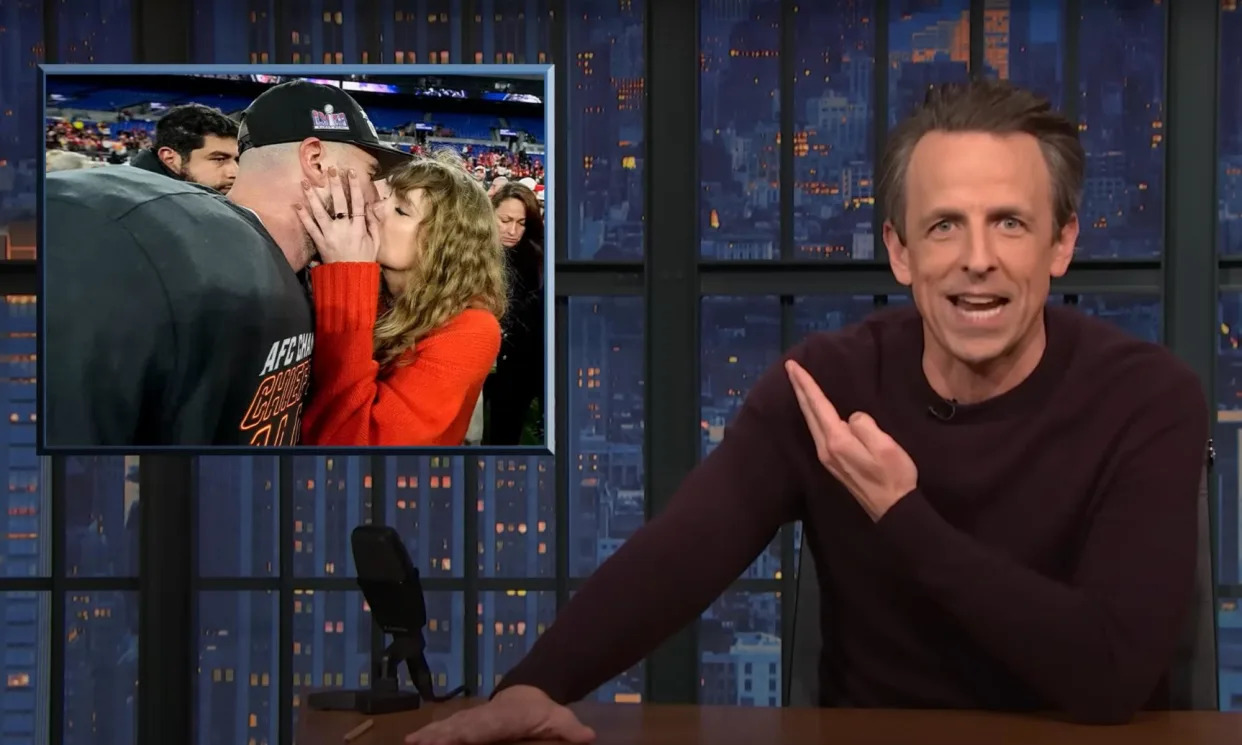
Seth Meyers: ‘The conservative movement is so rotted, so intellectually bankrupt, that they have found themselves in a place where they are somehow enraged about a popular singer dating a football player.’
Late-night hosts continued to mock the right’s obsession with Taylor Swift on Wednesday evening, as several conservative commentators peddled baseless conspiracy theories about the pop star. “The conservative movement is so rotted, so intellectually bankrupt, that they have found themselves in a place where they are somehow enraged about a popular singer dating a football player,” explained Seth Meyers on Late Night.
The Fox News host Jesse Watters, for example, said Swift’s romance with the Kansas City Chiefs tight end Travis Kelce was “cooked up in a lab”, while the ex-presidential candidate Vivek Ramaswamy called them an “artificially culturally propped up couple” staged for a Biden endorsement.
“Allow me to quote a Taylor Swift lyric when I say: you people are out of your fucking minds,” Meyers retorted. “I’m just kidding – that’s not a Taylor Swift lyric. It’s Seth’s version.
Related: Jimmy Kimmel on Taylor Swift NFL conspiracy theories: ‘They think football is fake and wrestling is real’
“Seriously, what is wrong with you?” he continued. “This is how much the Republican party has changed: there was a time when a famous singer dating a football player and spending quality time with his family would’ve been their dream.
“They used to elect politicians who were football players, or ones who look like footballs,” he added over a photo of Trump. “I don’t even know who you are any more, Republicans. Seriously, this is like such an innocent all-American thing. They’re kissing on the field after he wins the big game and she’s celebrating with his mom and dancing along with fans, how can you be mad at that?
“Without Taylor saying a word about the 2024 election, they have somehow spun themselves into an elaborate conspiracy theory where mysterious forces are manufacturing her fame in order to set up an endorsement of Joe Biden,” he concluded. “Because only a grand conspiracy would explain why she might prefer Joe Biden over a man who every day behaves worse than any man in a Taylor Swift song.”
Stephen Colbert
“With Trump’s nomination a near certainty, the Maga mob is now turning their focus to their leader’s last remaining political rival: Taylor Swift,” said Stephen Colbert on the Late Show.
According to several sources, Trump was “freaking out” over reports that Joe Biden is seeking an endorsement from the pop star. “C’mon Joe, seeking the endorsement of a pop star? Don’t you think that’s beneath the dignity of the office of Taylor Swift. She has to have standards!” Colbert joked.
Biden’s team has reportedly even considered sending the president to a stop on the Eras Tour. “Oh, that would be fun,” Colbert deadpanned. “I wonder what era he’d dress as. I’m gonna guess Mesozoic.
“Of course, we can’t even fantasize about Joe Biden screaming out the bridge to Cruel Summer without Donald Trump ruining it,” he added. “Because Trump is jealous now,” and privately claiming that he is “more popular” than Swift.
“What?! More popular than Taylor Swift? That is insane. Can you imagine Trump selling out stadiums in Tokyo?” Colbert reacted.
A jokingly self-described “Swiffer”, Colbert defended the pop star against the numerous far-right conspiracy theories attempting to discredit her. “Taylor is one of the few joyful things we have in this country and I’m not going to stand here and let Trump’s TV goons drag her into the hell slop of grievance and hair gel,” he said. “This country dumped Donald Trump and we are never, ever getting back together, like ever.”
Jimmy Kimmel
And in Los Angeles, Jimmy Kimmel relished the prospect of Trump being on the hook for as much as $300m in his civil fraud case in New York, on top of the $83.3m he now owes E Jean Carroll after a defamation trial. “Which means somebody is probably about to release a whole new batch of NFT trading cards,” Kimmel joked.
If penalized in the civil fraud trial, Trump could be barred from conducting business in his original home state of New York. “You think getting caught running a fake university would’ve triggered that penalty already,” Kimmel noted.
In a potential bid to distract from the former president’s many legal woes, “Trump’s campaign team has been working on ways to turn their culture warriors against Taylor Swift in the event she decides to endorse Joe Biden,” Kimmel said. “So if you’re a Republican, I guess enjoy her music while you still can before the Ayatollah Complain-y declares a fatwa on her.”
As for Trump’s claim that he was more popular than Swift, Kimmel did not mince words: “If Taylor Swift told her fans to storm the Capitol on January 6, they would’ve succeeded and they would be running the country right now.
“Who is he kidding?” he added. “If Donald Trump held a rally at SoFi stadium here in LA, they would still have enough empty seats to also hold a Taylor Swift concert that night.”
Why is the right obsessed with Taylor Swift?
Joel Mathis, The Week US
Wed, January 31, 2024 a
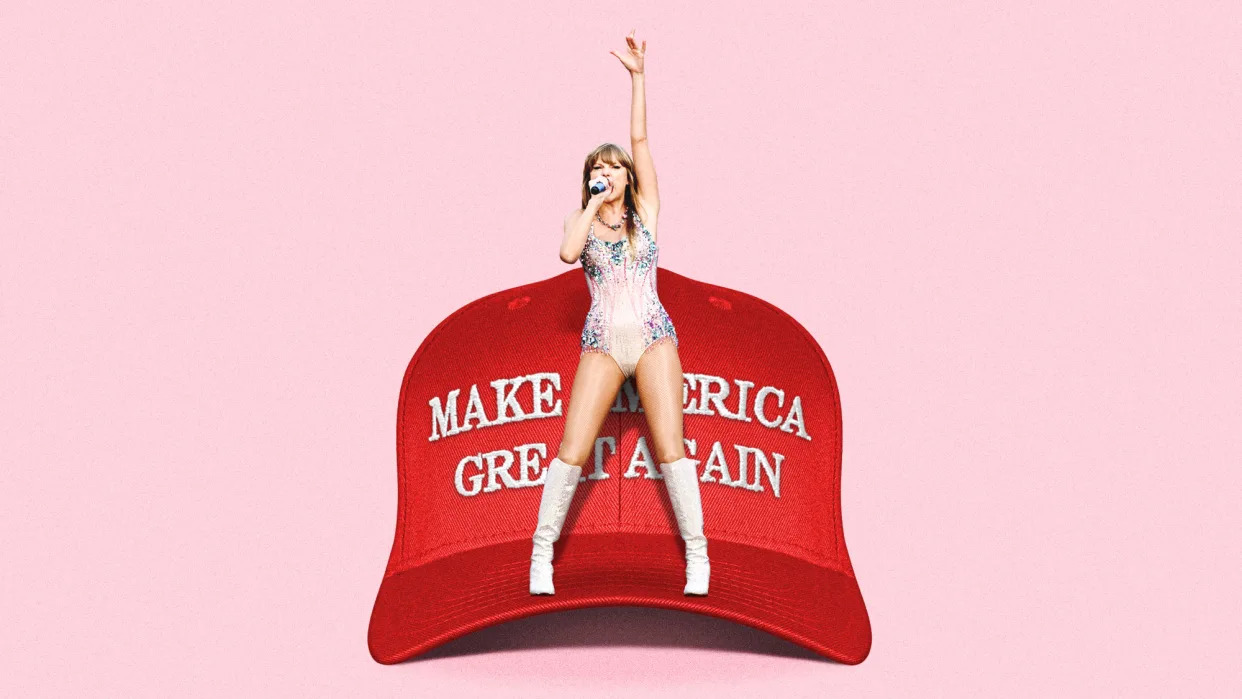
Taylor Swift performing on top of a red MAGA hat.
Any number of issues are at stake in the 2024 election: The future of democracy, immigration, America's role in helping Ukraine. It might be — again — the most important election of our lifetime.
This week, though, we're talking about Taylor Swift.
"Conservative media personalities are raging" over Swift, Axios reported, seeing the "pop megastar" — and onetime endorser of President Joe Biden — as a public figure whose fans "heed her calls to go out and vote." Right-wing figures like Fox News' Jesse Watters and Jeanine Pirro, former presidential candidate Vivek Ramaswamy, and Donald Trump lawyer Alina Habba have started speculating that Swift's relationship with football star Travis Kelce is part of "a deep state psyop orchestrated by the NFL and Democrats to work in President Biden's favor."
No. Really.
Swift's all-encompassing fame has even earned Trump's attention. Rolling Stone reported the former president has "privately claimed that he is 'more popular'" than the singer. Trump was even reportedly astounded when Swift beat him out for Time Magazine's 2023 "Person of the Year." (Vladimir Putin and Xi Jinping were actually the other finalists.) And his team is trying to figure out how to respond if Swift endorses Biden again. "Another left-wing celebrity who is part of the Democrat elite telling you what to think," sniffed a member of Trump's campaign team. What is going on?
What did the commentators say?
"The online world's capacity for wild, untamed nonsense is endless," Jeffrey Blehar lamented at National Review, a conservative outlet. Right-wing conspiracy-mongering about Swift and Kelce reflects "thinly veiled bleats of fear about Trump's standing with women." And for many American women — "except your 85-year-old nana" — Swift has become a "cultural avatar." But if those women abandon Trump, it's more likely because of things like the $83 million judgment he must pay after E. Jean Carroll's defamation lawsuit. "It won't be because of anything Taylor Swift said or did."
Conservatism's Taylor Swift obsession reflects the right's "inability to just be normal itself, even for a minute," Ross Douthat, himself a conservative, argued at The New York Times. Hostility toward the singer has been growing since she endorsed Democratic candidates in 2018 and 2020. But her relationship with Kelce "has transformed a merely unfavorable impression into outright paranoia." Too bad: The Swift-Kelce romance offers the "romantic iconography that much of the online right supposedly wants to encourage and support."
"Maybe Republicans should wonder why all the attractive, likable people hate them?" Brian Beutler asked at his Off Message Substack. There's no conspiracy in the Swift-Kelce romance: "At the highest echelons of the cultural elite, attractive people like Swift and Kelce meet and fall in love" all the time. The Republican Party should focus less on the strange conspiracy theorizing and focus more on "trying to be decent and likable" if it wants to appeal to women voters.
What next?
There's a danger to Trump in the right's Swift obsession, E.J. Montini argued at The Arizona Republic. Turning against America's most-beloved pop star is "the dumbest thing the MAGA cult and its media enablers have done." Why? Because a Swift endorsement really "could alter the election's outcome." One poll showed that 53% of Americans are fans of the singer. She has more than 500 million social media followers. She has reach that would make any campaign envious. Why mess with that? All the online hostility "may be guaranteeing that Swift, at some point, will endorse President Joe Biden."
If so, Trump's allies are prepared. Biden might be counting on Swift to save him, "but voters are looking at these sky-high inflation rates and saying, 'We Are Never Ever Getting Back Together,'" Jason Miller, a Trump adviser, wrote to Rolling Stone. At this point, though, the feeling might be entirely mutual.
Never mind all that election nonsense, though. Kelce's Kansas City team plays in the Super Bowl in less than two weeks. Swift, meanwhile, plays a concert in Tokyo the night before. Can she make it back to the United States in time to watch the big game? We'll find out. And bizarrely enough, the fate of the presidential election might ride on it.
Travis Kelce thanks Taylor Swift ‘for joining the team’
Lisa Respers France, CNN
Thu, February 1, 2024
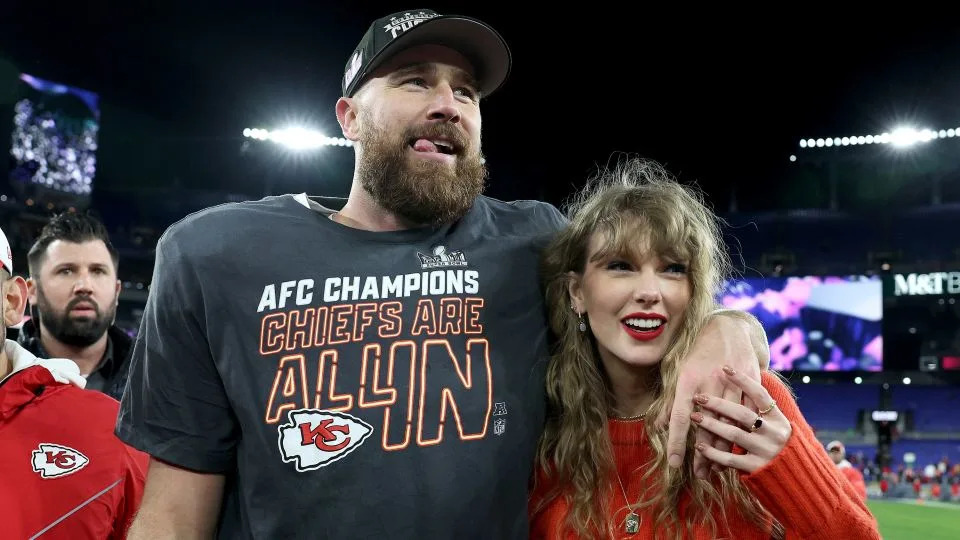
Welcome to the team, Taylor Swift.
With all her support for her boyfriend Travis Kelce, who is headed to the Super Bowl with the Kansas City Chiefs, Swift, of course, came up during Wednesday’s episode of Kelce’s podcast, “New Heights.”
His brother and co-host Jason Kelce, who plays for the Philadelphia Eagles, said, “Shout out to the newest members of the Chiefs Kingdom!”
“Taylor Swift, who has officially reached the Super Bowl in her rookie year,” Jason Kelce continued.
“Shout out to Tay!” Travis Kelce responded with a laugh. “Thanks for joining the team!”
He also confirmed the timeline of when he and Swift got together.
During an appearance on “The Pat McAfee Show,” Kelce said he and Swift had already been seeing each other by the time she appeared at one of his games in September to cheer him and the Chiefs on.
“Yeah, we had known each other close to a month up to that point,” Kelce said. “It wasn’t just an out of the blue, ‘Hey, come to the game.’”
In an interview with Time Magazine last year, Swift said the same, telling the publication, “By the time I went to that first game, we were a couple.”
MAGA World Is About to Meet Taylor Swift’s Fandom. It Won’t Go Well.
Catherine Kim
Thu, February 1, 2024
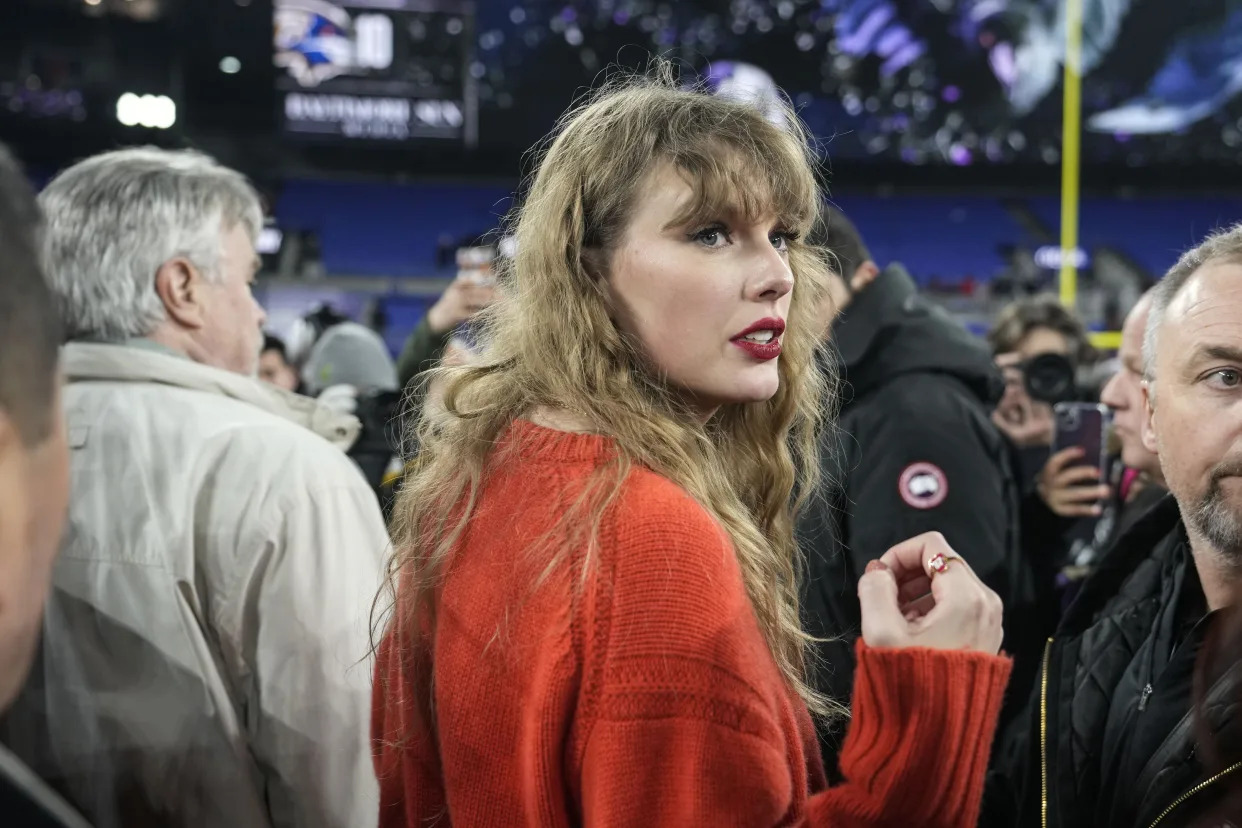
Taylor Swift has many titles: cultural juggernaut; international pop star; billionaire businesswoman. She can now add MAGA conspiracy theory target to the list.
Far-right internet personalities and even a former Republican presidential candidate are spreading the notion that something is not quite right with Swift’s relationship with Kansas City Chiefs star player Travis Kelce — and that somehow the Super Bowl is rigged and it’s all leading up to a Swift presidential endorsement of Joe Biden.
Swift was once famously politics-averse, but she inched into the arena in 2018 when she endorsed Tennessee Democratic Senate candidate Phil Bredesen, and then she backed Biden in 2020. That may have first soured some conservatives on Swift, but in recent days, the right has seemingly launched a full-bore attack on her. It seems like incredibly foolish politics, particularly as the gender gap grows and Republican support with suburban women erodes.
To explore how Swift’s influence has grown and how the attacks could backfire on the GOP, POLITICO Magazine reached out to Brian Donovan, a University of Kansas professor who teaches a popular college course called “The Sociology of Taylor Swift.”
“The Swiftie fan is arguably the most immersive and intense fandom in the U.S. right now,” Donovan said. “And to anger them is just political folly. They are a political force that I don't think anyone really should mess with.”
This interview has been edited for length and clarity.
Why is Taylor Swift suddenly at the center of the political conversation?
I think there is a cyclical reaction happening where we saw with the Barbie movie and with the Eras Tour, a kind of woman-centered cultural aesthetic take hold of the American imagination. And I think there's a ton of backlash to that driven by real basic sexism and misogyny.
If you look at the history of Taylor Swift, if you go back 10 or 12 years, her main critics were actually coming from the left. There was a feminist discourse that argued that she was too heteronormative, that she is supporting the patriarchy by writing these love songs with a straightforward, boy-meets-girl, happily-ever-after kind of narrative. So you would think that the right would embrace that. And for a while, when Taylor was more quiet about her politics, they had this notion that she was secretly one of them. You saw this in around 2017, 2018 when literal Nazis like Andrew Anglin or folks from the GamerGate community like Milo Yiannopoulos, were posting these memes that were suggesting that Taylor was secretly a white supremacist.
And so the fact that she had this political coming out in 2018, and started to embrace leftist causes, that was the first moment when the right rejected her. And as she gained cultural power over the last year, I think that's made her an easy target. You would think that her dating a football star would be something that would be satisfying to cultural conservatives — she's playing out a standard conservative script of falling in love with a football star — but the fact that she's not on their team is especially irksome for a lot of folks. On the right, it's seen as a betrayal.
Sexism and a sense of betrayal — is there anything else that might be fueling this hate we’re seeing from the right?
The intensity is coming from different levels. Again, it's this basic sexism. She is unmarried. She is an extremely successful businesswoman. And I know that a lot of folks on the right probably do not aspire to be a pop star, but a lot of them aspire to be successful in business. And she has lapped them over and over. She has become a billionaire based on her own artistry. And so there's a jealousy factor as well.
Another part of this is that she is not easily consumable as a sex symbol. What makes Taylor Swift so unique is that her celebrity persona, unlike pop stars of the past few decades — think of Madonna or Britney Spears — is not centered on the male gaze. She's not denying or muting her sexuality, but her performances are not catering to men. Her persona is crafted around this kind of goofy, almost nerd-like relatability and I think that is also irksome because she is not playing out the standard, patriarchal playbook of being a consumable Barbie doll sex symbol.
There’s a growing gender divide in politics. Do you think the conservative attacks against Swift will further alienate women voters from the Republican Party?
Absolutely. What is fascinating to me about this whole spectacle is it seems like political suicide. She certainly has appeal among women, but she has such a broad demographic appeal — racially, in terms of age, in terms of socio-economic status. It just seems like attacking her, from a strategic political standpoint, makes no sense whatsoever.
And that's why I think some of these attacks, they will be short-lived. Because the folks that have the money, that are putting resources behind these political campaigns, are going to talk to people like Vivek Ramaswamy and say, “This is not a good strategy for you.”
And it will alienate women voters in the long term, for sure, because Taylor's politics, they're not that radical. She's not the kind of radical feminist figure that they are painting her to be, and I think a lot of women see themselves in Taylor. She is highly relatable. And she, through her songwriting, lets us feel like we have a bond with her. And so the rabid attacks against her are going to turn people away on a very deep level.
Tell me more about the demographics of Swift’s fan base. Are there any notable traits or political trends?
Morning Consult did a deep dive into her fan base demographics. And they found, not surprisingly, that her main fan base is primarily white, primarily women and primarily millennial.
What's unique about Taylor Swift is the intergenerational appeal that she has. And you saw that over the summer with parents taking their daughters to the Eras Tour. She's been a star for 17 years. There are folks that I'm interviewing for my book that have literally grown up with her. She was there for them through all the different turning points in their life. So she can draw younger listeners who are experiencing her music for the first time, listeners who are millennials that see themselves in Taylor Swift, and fans that are my age and older that see an element of nostalgia in Taylor. So what is really powerful and unique about her is that demographically she has this cross-generational appeal.
Based on the folks that I've interviewed, she has a way of writing that, coupled with her celebrity persona and media appearances, connects uniquely with the experiences of young women. The Swiftie fan is arguably the most immersive and intense fandom in the U.S. right now. And to anger them is just political folly. They are a political force that I don't think anyone really should mess with.
What makes Taylor Swift’s fandom such a political force?
It's both the sheer number and the intensity of their devotion to Taylor Swift.
A lot of Swifties take their cues from Taylor Swift. During the pandemic, when she released the album "Folklore," she changed her entire aesthetic from the multicolored "Lover"-era aesthetic — which was this psychedelic, 1960s vibe — to this cottage-core, flannel vibe. Swifties went right along with it and started buying flannel and started adopting that style. And so she is very influential on a cultural level.
But also Swifties listen to her statements about politics as well and absorb them and act on them. And so I think that the fear coming from the right that she could make an endorsement that will act as a political force and be consequential for elections — that's not inaccurate. There's some truth there.
Swift has resisted the political arena for so long. What are her politics? Does she even want to be in the political limelight?
Her politics are fairly mainstream. She wants reproductive rights. She has come out and supported the Violence Against Women Act — some very fairly mainstream things that are not terribly controversial among a wide swath of the American electorate.
She had a moment in 2018 when she had a political coming out. She started speaking out in particular in support of LGBTQ+ rights. And there was a period of time when she became more politically active. That was when she supported Phil Bredesen against Marsha Blackburn. That’s when [then-President Donald] Trump said he liked her music about 25 percent less now. And for a lot of Swifties, and even those who weren’t into Taylor Swift, that was an important moment because it showed she was one of us. That she was in the same political orbit as a lot of us.
She hasn't really continued with that. The pandemic hit, and other than a tweet about the Dobbs decision and a speech that she gave during one of her concerts during Pride Month, she's been very relatively politically silent. And that's frustrated a lot of the more social justice-oriented Swifties and Swifties who are further on the left. So it's interesting that she's receiving criticism from the right for being this avatar of the left wing. And at the same time, she's receiving criticism from the more far-left Swifties for not being vocal enough.
Do you foresee Swift becoming any more political after the recent MAGA meltdown?
I don't think so. I think she'll endorse Joe Biden. And she might even make a campaign appearance or two, but I don't see her throwing herself into politics in a really robust way. Part of that is due to the fact that I just don't think she speaks the language of politics and activism. She’s a great storyteller and is brilliant at so many things. But I don't think she sees that as one of her strengths.
The other reason I don't think she is going to be more vocal about politics is personal safety. The article that ran in Rolling Stone that right-wing operatives are declaring a “Holy War” on her honestly frightened me. We're living in a time of heightened political violence and deep political polarization. And she is out in public performing for tens of thousands of people. Just on a pure safety level, her getting more vocal about politics might not necessarily be a good thing.
Would a Swift endorsement give Biden a major boost in popularity?
I don’t think so. The people who are already big Taylor Swift supporters, most of them are going to vote for Biden anyway. And looking at what happened in 2018, when she supported Phil Bresson — he still lost to Marsha Blackburn. So her endorsements, as important as they are, can only go so far. Where I think she can have an impact and maybe a big political boost for Biden is in getting out the vote. She touted a Get Out the Vote website on her Instagram account, and it drew 35,000 new voters within hours.
What do you think about Donald Trump reportedly grumbling that he’s “more popular” than Taylor Swift?
We know he loves the trappings of celebrity. And so it must irk him that she is both more popular than he is and has more money than he does right now. And so I think that her mere existence is tapping into some deep insecurities in his psyche. And we're seeing that play out by his surrogates, as well.
Why do we demand political alliances from celebrities? What does that say about our political atmosphere right now?
Increasingly, it seems like every consumer and entertainment choice we make is somehow politically coded. What beer one consumes, or where one goes shopping, whether it's Target or Walmart — all of these micro-decisions have somehow become part of political discourse, and it's exhausting. But I feel like there's comfort in that too. It's part of that relatability aspect that is so important for celebrity culture. We want to know the people that we're spending time and money on share our broad value system.


